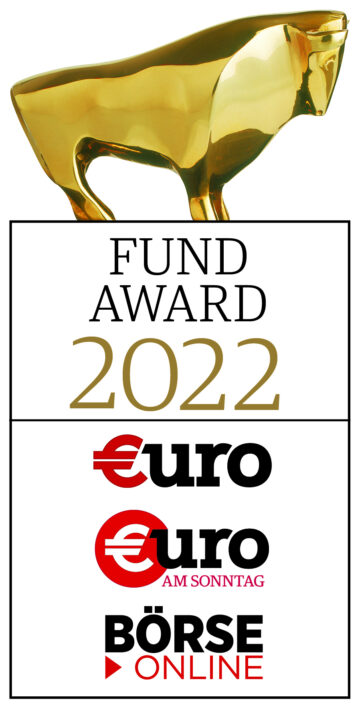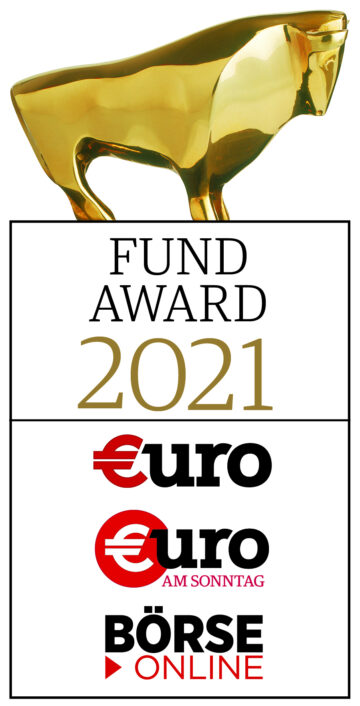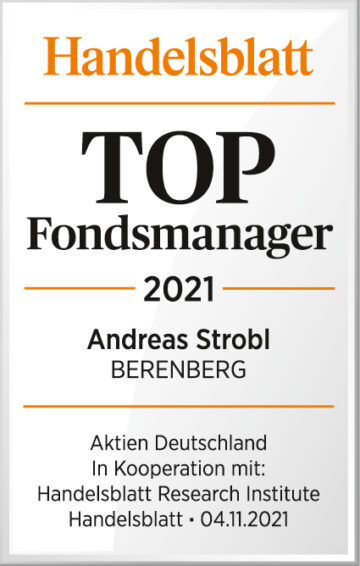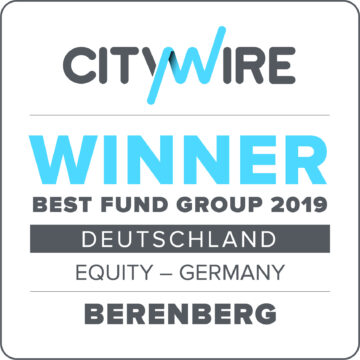Investment Strategy
Innovation and digitalisation: Germany does not need to hide. The fund management of Berenberg Aktien Deutschland focuses on the most convincing “Blue chips” as well as above-average growth "hidden champions" from the mid- and small-cap segment. The strategy is based on a disciplined bottom-up stock selection, focusing on companies with excellent business models, strong entry barriers and top management.
- Diversified portfolio of 40-60 stocks
- Investment level can be flexibly steered (usually 90-130%)
- Including mid-and small-caps (usually 40%)
- Benchmark-agnostic selection
Learn more about our investment philosophy in equity fund management
Fund data
| ISIN | LU0146485932 |
|---|---|
| WKN | 542188 |
| Inception date | 01.08.2002 |
| Issue price (19.11.2024) | 91.17 EUR |
| Redemption price (19.11.2024) | 86.83 EUR |
| Fund volume | 17.89 Mio. EUR |
| Share class volume | 15.42 Mio. EUR |
| Currency | EUR |
| Minimum investment | - |
| Asset Manager | Joh. Berenberg, Gossler & Co. KG |
| Management company | Universal-Investment-Luxembourg S.A. |
| Custodian | State Street Bank International GmbH, Luxembourg Branch |
| Use of income | Accumulating |
| End of financial year | 31.12. |
| Registration and Distribution | DE, AT, CH, LU, LI, ES |
| SFDR Classification (Sustainable Finance Disclosure Regulation) | Article 8 |
Costs
| Issue surcharge | Up to 5.00% |
|---|---|
| Management fee p.a. | 1.50% |
| Custodian fee p.a. | 0.09% |
| Total Expense Ratio (TER) p.a. | 1.74% |
| Performance fee | none |
Chances and risks
| Chances | Risks |
|---|---|
| High return potential of stocks over the long term | High susceptibility of shares to fluctuation, price losses possible |
| Development of growth stocks occasionally above average | Share value may fall below the purchase price at which the customer acquired the share |
| Development of small cap stocks above average in certain phases | Below-average development of growth stocks possible at times |
| Possible additional earnings through individual value analysis and active management | Below-average development of small cap stocks possible at times |
| No guarantee of success for individual value analysis and active management | |
| Concentration risk through focusing on investments in one single country | |
| Risks resulting from the use of futures |
Further details on the opportunities and risks of this fund can be found in the sales prospectus.
Indexed performance
Performance in 12-month periods
Monthly performance
| Year | Jan | Feb | Mar | Apr | May | Jun | Jul | Aug | Sep | Oct | Nov | Dec | YTD |
|---|---|---|---|---|---|---|---|---|---|---|---|---|---|
| 2014 | -1.38 | 1.42 | 0.19 | 0.07 | 1.90 | 0.23 | 0.07 | 0.24 | -0.04 | -1.46 | 2.78 | -0.86 | 3.10 |
| 2015 | 2.99 | 2.54 | 1.61 | -0.33 | 0.55 | -3.09 | 0.68 | -5.54 | -2.47 | 6.04 | 1.29 | -2.01 | 1.76 |
| 2016 | -5.71 | -0.31 | 2.89 | -0.03 | 0.11 | -0.99 | 2.67 | 0.59 | -0.32 | -1.35 | 1.59 | 2.83 | 1.68 |
| 2017 | 0.09 | 5.07 | 1.94 | 1.04 | 0.84 | -3.06 | -0.76 | 0.36 | 7.36 | 3.19 | -2.36 | 0.74 | 14.94 |
| 2018 | 3.49 | -3.98 | -3.67 | 4.12 | 1.87 | -2.28 | 4.48 | 0.41 | -3.83 | -10.08 | -3.86 | -9.42 | -21.62 |
| 2019 | 11.02 | 3.25 | 0.55 | 10.42 | -6.08 | 3.67 | -1.70 | -3.45 | 1.13 | 3.99 | 4.20 | 2.09 | 31.58 |
| 2020 | -0.40 | -10.78 | -18.71 | 11.35 | 9.51 | 2.37 | -0.01 | 5.76 | -0.31 | -8.51 | 17.99 | 4.76 | 7.50 |
| 2021 | 0.39 | 0.58 | 3.47 | 3.53 | 1.66 | 2.19 | 2.62 | 5.01 | -3.99 | 4.12 | -2.82 | 4.33 | 22.73 |
| 2022 | -9.14 | -7.42 | 0.23 | -4.95 | -0.92 | -12.39 | 8.98 | -8.65 | -8.39 | 7.98 | 9.43 | -4.70 | -28.57 |
| 2023 | 9.81 | 0.81 | 0.63 | -0.45 | -3.63 | 2.13 | 3.11 | -2.75 | -6.00 | -5.77 | 10.77 | 4.09 | 11.77 |
| 2024 | -1.83 | 1.03 | 2.92 | -4.66 | 2.15 | -2.41 | 1.12 | -0.47 | 0.99 | -2.93 | - | - | -5.57 |
Source: Berenberg, Management company
The charts and tables regarding performance shown here are based on own calculations according to the method developed by the German Investment Funds Association (BVI). They illustrate past performance. Future performance can deviate both positively and negatively from these calculations. Gross performance (BVI method) takes into account all charges at fund level (e.g. management fee), net performance plus the issue surcharge. Additional charges can arise for individual investors (e.g. custody account fees, commissions and other fees). Model calculation (net): An investor wants to purchase fund units for EUR 1,000 EUR. Considering a max issue surcharge of 5.00% he has to payEUR 50.00 for the purchase. Also, fees may be charged for the administration of the safe custody account, which will lower the performance. Past performance is not a reliable indicator of future performance.
Performance after issue surcharge
| 1 year | 0.10% |
|---|---|
| 3 years | -26.18% |
| 5 years | 1.76% |
| since inception | 74.61% |
| Max. Drawdown 5 years | -44.38% |
Source: Berenberg, Management company | State: 19 Nov 2024
Risk figures
| Volatility - 1 year | 12.68% |
|---|---|
| Volatility - 3 years | 19.91% |
| Sharpe Ratio - 3 years | -0.57 |
| Maximum Drawdown - since inception | -44.38% |
Currencies
Sectors
Countries
Asset classes
Top Holdings
Monthly market comment
The US elections, increased geopolitical risks in the Middle East and a mixed reporting season are fueling growing volatility in the capital markets. In October, the performance of the Berenberg Aktien Deutschland Fonds was negative both in absolute terms and relative to the benchmark. Despite solid third-quarter figures, Symrise shares weakened after management made cautious comments about growth. Siltronic's shares also fell significantly despite solid quarterly figures, after the company remained cautious in its outlook. Bechtle also performed negatively after a second profit warning this year due to continued weak demand. SAP shares performed positively after the company reported solid third-quarter figures and raised its outlook. Siemens Energy shares also performed positively, albeit without any relevant news flow. Deutsche Telekom's medium-term targets, as communicated at its Capital Markets Day, convinced investors. This led to an increase in the share price. There were no purchases or sales in October.
Portfolio Management
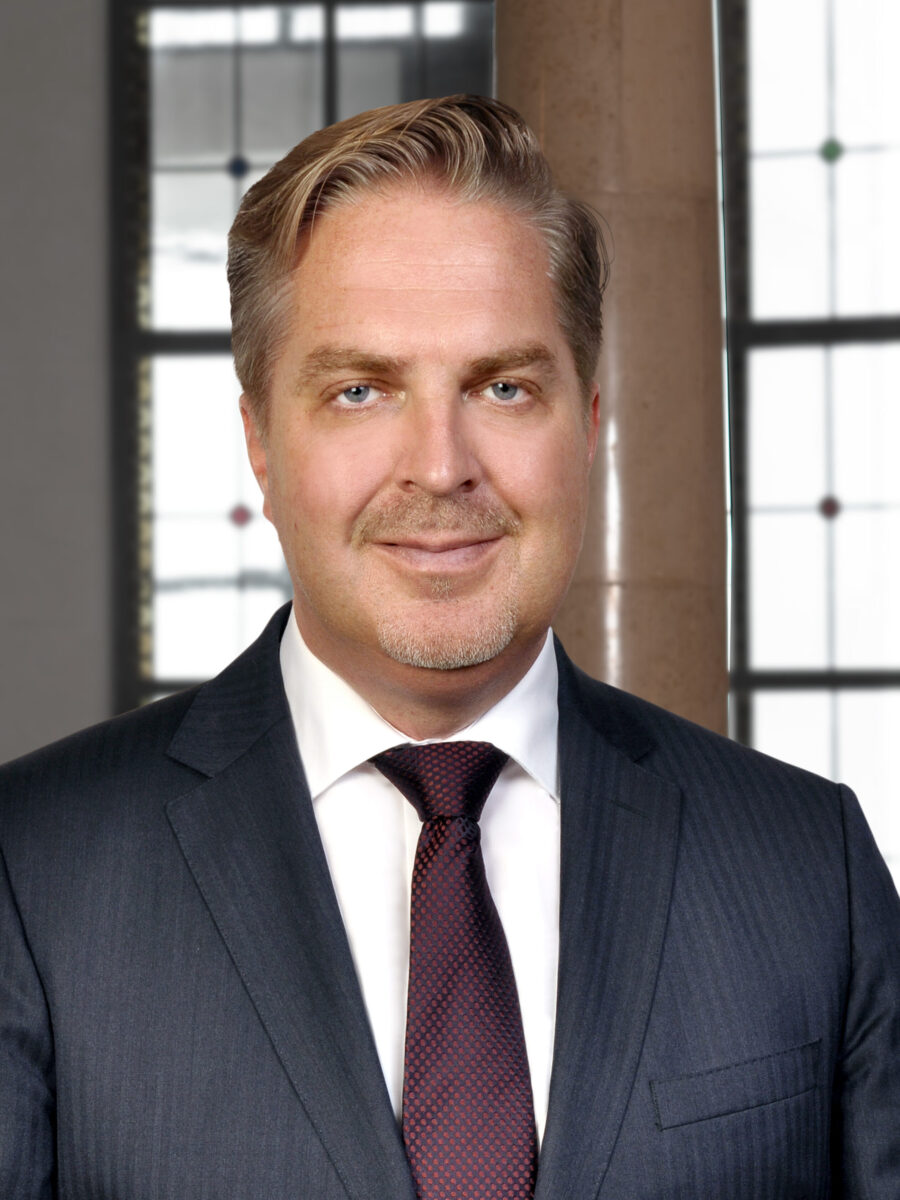
Andreas Strobl
Andreas Strobl has been a Portfolio Manager at Berenberg since November 2016. He began his professional career in 2002 as a Sell-Side Analyst at BayernLB in Munich. In 2006, he moved to Allianz SE (Aequitas GmbH) as a senior Investment Manager. Since 2015, Andreas Strobl has worked as a Senior Portfolio manager at Allianz Global Investors in Frankfurt, where he was responsible for the management and development of various European Small/Mid-Cap equity portfolios. He studied business administration at the LMU in Munich. In 2005, he graduated at the top of his class as a CIIA (Certified International Investment Analyst) and CEFA (Certified European Financial Analyst).

Sebastian Leigh
Sebastian Leigh has been Portfolio Manager at Berenberg since October 2017. Previously, he spent three years as an Associate in the Assurance division of EY, with a primary focus on automotive and healthcare companies. He studied Accounting and Finance at the University of Kent.
Consideration of ESG Elements
Identifying companies and business models that will be successful in the long term is the basis for good investment decisions. Environmental, Social and Governance (ESG) factors are key factors in decision making and are therefore integralcomponents of the investment process.
CO₂-Intensity
The fund does not actively manage its carbon footprint, however, emissions data such as CO2 intensity are relevant parameters which can be used to assess the efficient management of a company and the extent of transition risks.
ESG Score
The data provider MSCI ESG uses an ESG score of 0 to 10 to assess the management of material ESG risks of portfolio holdings compared to competitors.
ESG Controversies Screen
Investments in the fund are monitored for ESG controversies and, with the help of MSCI ESG data, flagged according their severity. Thereby, potential ESG risks of investments are identified. In the case of an orange flag (severe controversy), we enter into an active exchange with the company. In the case of a red flag (very severe controversy), the company is excluded.

